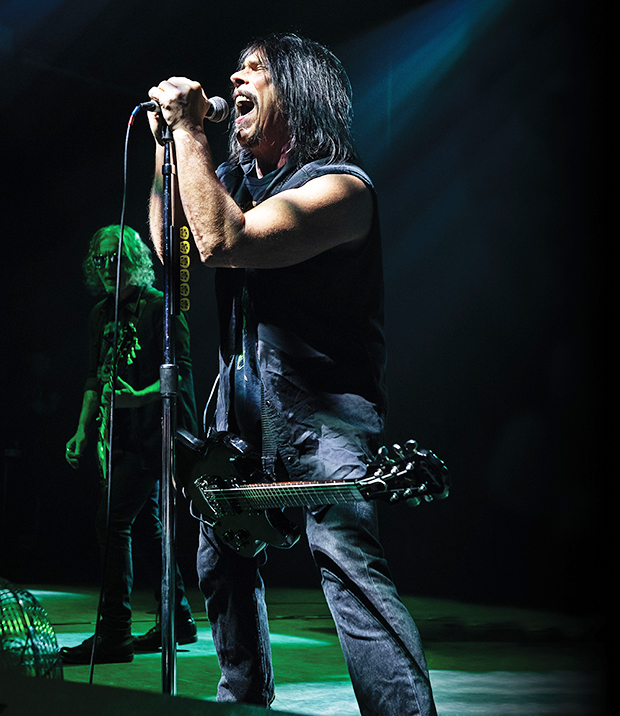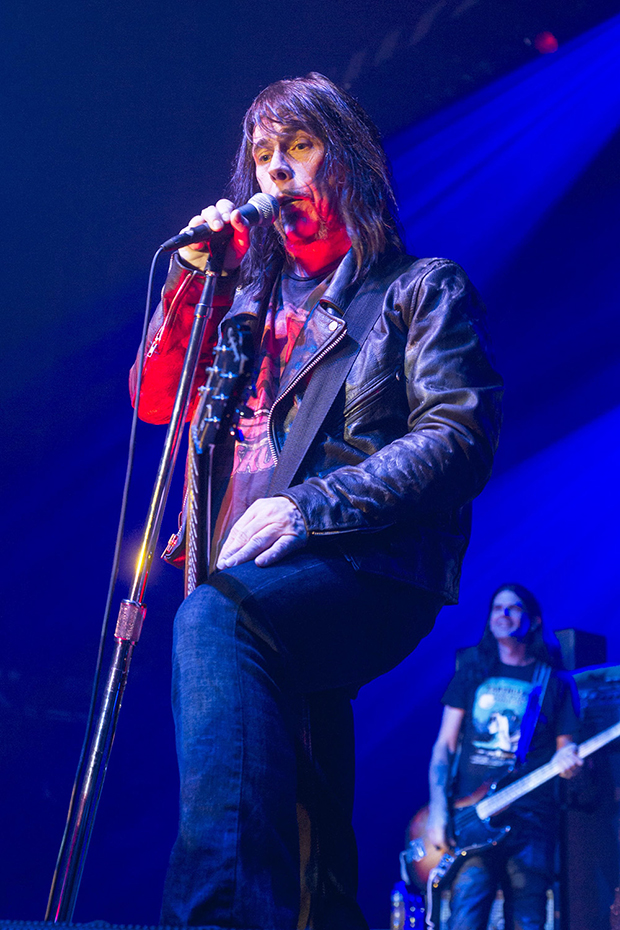When Dave Wyndorf joins the Zoom call, he’s illuminated by purple light and curtained by shadows, as if he’s broadcasting from the psychedelic dimension described in the opening track of A Better Dystopia, the new covers album from his band, Monster Magnet. Through the thundering silence of your vacuum-kept secret / Hiding out on the pulsating fringe of your bubbly, fudge mind / Deep, into the sanctuary of the ruby-lipped lizard. But, Dave is not Facetiming from the cave of the great blue-winged bat. He’s chatting from his home in New Jersey.
It’s fitting. A Better Dystopia represents a sort of homecoming for Dave and Monster Magnet. Recorded in 2020 during the COVID-19 pandemic, Dystopia has the band cover songs by pro-metal and psychedelic groups like Hawkwind, POOBAH, Jerusalem, and Josefus. The opening track, “The Diamond Mine,” recreates a monologue from Dave Diamond, a radio DJ who helped spread the gospel of psychedelia and acid rock in his programs. These songs laid the foundation for heavy metal as a genre – and for Monster Magnet as a band. “I just went back into my deep, deepest childhood memories and tried to come up with something that would be interesting — meaning songs not a lot of people had heard before. And it would stay within the band’s wheelhouses of music. This is stuff that inspired me to create Monster Magnet.”
A Better Dystopia, Dave tells HollywoodLife, started as a “filler idea.” They had just finished the European leg of their Powertrip tour when they arrived in North America in February 2020. But, COVID hit, leaving the band – like every other group – stuck with nothing to do. “It wasn’t a matter of like making money,” said Dave. “It was more just to do the right thing by us. Like, we’ve got a lot of energy we’re in the middle of a tour. We wanted to play and the prospect of me sitting in front of my television while the whole world’s in lockdown, and everyone’s crying the blues 24 hours a day while the government is being run by a mad man? I’m not going to sit there and watch that,” he says with a laugh. “So, okay. Let’s do a record.”
“As soon as I thought about doing it,” says Dave, “the ramifications of a bad cover album hit me almost immediately.” It’s an all-true fear for any established rock band. The cover album can be brutal for a fan, with some records coming off as disjointed messes. The cover album can also be perceived as an indication of a group’s creative drought, a low-water mark that has, in the past, preceded a band’s breakup — see Guns N’ Roses “The Spaghetti Incident?” or Rage Against The Machine’s Renegades. Yet, A Better Dystopia defies these fears. Monster Magnet has created a vivid sonic experience, cohesive from start to finish. It’s the soundtrack of an overnight road trip through the New Mexico desert. It’s the music greeting you when you enter a dimly lit dive bar, inviting you in with the smell of leather and cold beer.

Perhaps the greatest accomplishment of A Better Dystopia is how relevant it sounds in 2021. Though psychedelic music is associated with the Peace and Love Generation, the music was also the soundtrack for a time of social unrest, corrupt political administrations, and global anxiety. A Better Dystopia “ties in an interesting [observation] that I had,” says Dave, “in that, in my life now, I’ve been through two real, media-approved dystopia times – one being the last four years of crazy government, crazy fights, civil wars, post-truth madness, plus COVID. And the other time when I was really young, I remember being 12 years old in 1969 and America was on fire back then.”
“It was worse than it was now,” he adds. “We had riots every single summer, and they were drafting people to go to the Vietnam war. It was reflected immediately, especially in music. The times felt crazy, and the music sounded crazy. There was all this music coming out – and it wasn’t even getting on the radio. It was filling up the record stores and going out to people. And it really was reflected in the sounds of the music, the lyrics — the ambiguous, strange lyrics — just general insanity. It was great. It was really cool. It was there. It was on the street. Coming out of the record store, you actually felt like these records were made in the time you lived in.”
There may never be a similarly uniformly seismic shift in the musical landscape again. Modern listeners aren’t reliant on a single source for music anymore, so shifting trends and reflective attitudes in specific scenes might be more subtle to pick up. “There’s a bigger wealth of music” today, says Dave, before noting how the “the cultural experience was very singularly unique” when the songs that make up A Better Dystopia first came out.
Though A Better Dystopia reflects the times of 2021, it was also a way for Dave to celebrate a pivotal time in his life. “I started Monster Magnet when I was 28. So, it was late. I was in other bands,” he says, referencing his punk/power-pop group, Shrapnel. “I started Monster Magnet because of my love for that stuff that I first got into.”
“When I went back to these songs to do the cover record, I was like, ‘yeah, you know, people should know.’ If there’s any way I could share the love and turn the people onto [these songs] in one way or another — definitely. But, really was the main reason really was to go to Monster Magnet fans and say, ‘if there are any doubts on where the origins of this band came from, let there be no doubt. This is the stuff that turned me on. It’s kind of like a roots record.”

After taking a trip to the past, what does the future hold? “I am so ready to go,” he says. “We’ll probably start playing around Christmas time in the states. Some way or another. I know we’re going to do some anniversary shows for our first album, Spine of God. It’s like 30 years old now. And, of course, I want to tour A Better Dystopia like hell because the songs are f-cking great. They’re going to work great live.”
“If I could start a set with ‘Mr. Destroyer,’ I guarantee you, get in a room full of a couple of hundred people, a thousand people at the right moment, if you raise your hand to go—” This is where, in the chat, he shouts, conjuring up the purple energy from his New Jersey dimension to bellow the title to “Mr. Destroyer,” a preview of what fans can expect when the band returns to performing live. After delivering the line, he smiles. “People are going to respect that. You’re going to go, ‘Yes. I want Mr. Destroyer.’”
Perhaps the best thing about A Better Dystopia is that Monster Magnet shows how, as Dave notes at the end of the call, that rock can be “funny and glorious and mean all at the same time — sometimes within the same song. It can have sarcasm, it could laugh at itself, and it could be really powerful. It doesn’t always have to be completely serious or testosterone-fueled to the point where there’s no emotion. That’s why I love this stuff because — this is what all those [rock] stereotypes were built on. So it feels like I really go to the well and says, ‘oh, you know, this is real stuff.’ This is like, ‘I just found a real dinosaur bone,’ but this is real, man. You know, these things really did exist.” And thanks to Monster Magnet’s phenomenal new album, it exists again.
A Better Dystopia is out now.